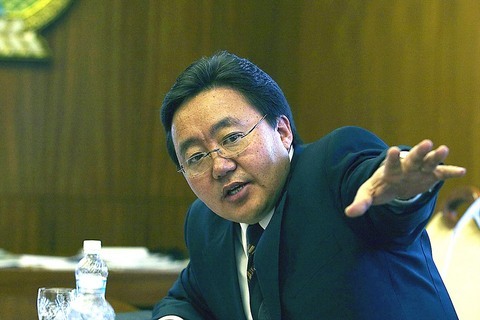Mongolian PM evolves from journalist to statesman (original) (raw)
Tsakhia Elbegdorj was running late. After his first 100 days as the prime minister of Central Asia's only multiparty democracy, he had stopped by a hospital to check his blood pressure.
The results, as he feared, were not good. The demands of the job, even in Mongolia, are relentless. "Holding this coalition together is like holding a raw egg," Elbegdorj said later that evening, cupping his hands together for effect.

Tsakhia Elbegdorj, the new Prime Minister of Mongolia, is a bespectacled intellectual whose 41 years track the extraordinary political transformation of this vast, thinly populated nation sandwiched between Russia and China.
PHOTO: NEW YORK TIMES
It was easier in graduate school at Harvard, he said, studying problems of government instead of dealing with them. It was more fun as an opposition journalist taking potshots at past Mongolian leaders, calling one Mongolia's Lenin and another Mongolia's Stalin.
Now, he has to receive the grandchildren of the two former leaders when they troop into his office to ask him not to remove their relatives' mausoleums from the capital's central square. The government plans to replace them with an enormous statue of Genghis Khan, still the proudest symbol of Mongolia, nearly 900 years after his death in 1227.
"Please don't call them Mongolia's Lenin and Stalin," Elbegdorj said, trying out his newly acquired diplomatic skills on a visiting reporter.
Perhaps Asia's most unlikely democratic leader, Elbegdorj is a pudgy, bespectacled intellectual whose 41 years track the extraordinary political transformation of this vast, thinly populated nation sandwiched between Russia and China. Like most members of his 17-member Cabinet, Elbegdorj studied in the Soviet Union but now advocates free market economics.
The son of a herder in Mongolia's far west, the young Elbegdorj proudly wore the red kerchief of a Communist Young Pioneer in elementary school. Twenty-five years later, he helped privatize the nation's livestock herds, all 31 million head.
In the army, he was so diligent in running a Revolutionary Youth unit that he won a scholarship to study Marxism, Leninism and journalism in the Ukrainian city of Lvov. Now, his Liberty Center foundation, which promotes political and legal reform, is overseeing translations into Mongolian of the works of Milton Friedman and Friedrich Hayek.
The turning point for Elbegdorj came in 1989, when the Soviet grip began to weaken. He quit a comfortable job as a reporter for a military newspaper to found Mongolia's first independent newspaper, called Democracy. Soon, he was a charter member of a group that is now revered as the 13 First Democrats, and took the lead in the protests that toppled the country's Communist government after a 70-year rule.
"We were tough, we went to jail, we led a hunger strike," he recalled over dinner, a five-course affair that moved from dried beets to sheep's tongue. The setting was the upstairs state dining room of Guest House No.30, originally the residence of Khorloo Choibalsan, the aforementioned Mongolian Stalin who put many of the Soviet dictator's policies into effect, including the execution of an estimated 17,000 Buddhist priests.
The communist era already seems like ancient history for Mongolia's overwhelmingly young population, which has proven remarkably receptive to democracy and embraced free speech and free markets. In two opinion surveys conducted this year by the Sant Maral Foundation, an independent polling group, policies for "the transition to the democratic system" won the support of 90 percent to 92 percent of respondents, while those promoting "the transition to a market economy in 1990" won the support of 86 percent to 88 percent.
"We want to show the world that so-called Western values not only belong to America, Europe, South Korea and Japan, but to Mongolia," Elbegdorj said, proud that Mongolia survives as a multiparty democracy in an authoritarian sea, with China to the south, Russia to the north, North Korea to the east and the autarchies of Central Asia to the west.
Exactly why is a matter of debate. Historically, Mongolians have been receptive to new ideas and gifted at foreign languages, a heritage of living for centuries on the Silk Road from Asia to Europe. Following 300 years of domination, first by China and then by the Soviet Union, moreover, they have an acute sense of the value of freedom.


